Which Myers-Briggs® Personality Types Struggle the Most to Find Their People?
Finding people who share your interests can be a daunting task. For some, it seems effortless, while for others, it feels like a never-ending challenge. I recently surveyed my email list, social media followers, friends, and clients (over 85,000 individuals) to uncover which Myers-Briggs® personality types find it easiest and hardest to connect with like-minded individuals. The question I asked was, “Do you find it easy or difficult to find people who share your interests?”
Today I want to go over the insights, and explore the possible reasons for the differences between types.

Not sure what your personality type is? Take our new personality questionnaire here. Or you can take the official MBTI® here.
Demographics:
Before we get to the fun part, here’s a little background on who participated in the survey:
- Gender: 74% female, 23% male, 3% chose not to answer.
- Age: 57% were between 35-64 years old, followed by 16% who were 65+, 10.63% aged 25-34, 8.36% aged 18-24, and 6.27% aged 0-17.
Table of contents
- Demographics:
- Overall Patterns:
- Which Myers-Briggs® Personality Types Struggle the Most to Find Their People?
- The Easiest to Connect
- 1. ESFP – The Champion
- 2. ESTP – The Daredevil
- 3. ENFP – The Visionary
- 4. ESFJ – The Defender
- 5. ESTJ – The Captain
- The Middle Ground
- 6. ENTJ – The Director
- 7. ENFJ – The Mentor
- 8. ISFJ – The Protector
- 9. ENTP – The Trailblazer
- 10. ISTP – The Vigilante
- The Hardest to Connect
- 11. INTP – The Prodigy
- 12. INFP – The Dreamer
- 13. INFJ – The Mystic
- 14. ISFP – The Virtuoso
- 15. ISTJ – The Detective
- 16. INTJ – The Strategist
- What Do You Think?
Overall Patterns:
I added up all the answers, averaged them out, and then looked at the differences between percentages of types with different preferences (Extroverts vs. Introverts, etc,.) Here are some interesting patterns I found:
Extroverts: When I added up the averages for each extroverted personality type, 51.42% of extroverts found it mostly difficult to find people who shared the same interests.
Introverts: When I added up the averages for each introverted personality type, 74.22% of introverts found it mostly difficult to find people who shared the same interests.
Sensors: When I added up the averages for each sensing personality type, 59.13% of sensors found it mostly difficult to find people who shared the same interests.
Intuitives: When I added up the averages for each intuitive personality type, 66.51% of intuitives found it mostly difficult to find people who shared the same interests.
Thinking types: When I added up the averages for each thinking personality type, 64.91% of thinking types found it mostly difficult to find people who shared the same interests.
Feeling types: When I added up the averages for each feeling personality type, 60.73% of feeling types found it mostly difficult to find people with similar interests.
Judging types: When I added up the averages for each judging personality type, 64.60% of judging types found it mostly difficult to find people with similar interests.
Perceiving types: When I added up the averages for each perceiving personality type, 61.04% of perceiving types found it mostly difficult to find people with similar interests.
Estimated reading time: 17 minutes
Which Myers-Briggs® Personality Types Struggle the Most to Find Their People?
The Easiest to Connect
1. ESFP – The Champion

56.25% found it easy
ESFPs are always on the lookout for fun, opportunity, adventure, and friendship. Often called “jacks-of-all-trades,” Champions could probably make doing their taxes an exciting game if they really wanted to. They have an engaging energy that draws people in, and their sense of humor, optimism, and enthusiasm often make them the life of the party. Rather than fixating on what makes them different, many ESFPs look for commonalities with other people, while still trying to stay true to their individual values. Getting involved and getting others involved is fun for them. Because of all these reasons (and more), it makes sense to me that this type has the easiest time finding people who share similar interests.
Find out more about ESFPs: What It Means to be an ESFP Personality Type
2. ESTP – The Daredevil

55% found it easy
ESTPs are known for their adaptability and wide range of interests, which helps them to connect with a variety of people. Often referred to as “Daredevils,” they live for excitement and are always on the lookout for new adventures. Their sense of humor and ability to read the room give them a head start when meeting new people. Thanks to their combination of spontaneity, charm, and zest for life, Daredevils often find it a bit easier to connect with others than some of the other personality types. That said, several ESTPs commented that in mid-life they’re finding it harder to find active friends. Many of their acquaintances would rather stay home and watch television than go out and do something recreational, which ESTPs tend to prefer.
3. ENFP – The Visionary
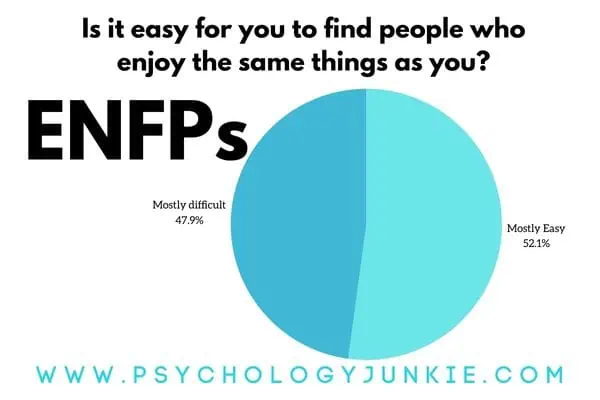
52.14% found it easy
ENFPs are famous for their friendliness, open-mindedness, and infectious enthusiasm. They enjoy exploring new ideas, brainstorming, and pursuing adventures. Because of this, they tend to have a wide array of interests, and thus, a wider net to cast when looking for like-minded individuals. But it isn’t all fun and games for ENFPs. Several ENFPs commented that they are finding the world increasingly disconnected and isolated; and many said they struggle to find people who even want to go out and socialize or try new things. One ENFP stated, “I’d like to develop closer friendships, but I feel like everyone I know just wants to go home and scroll their phones or binge Netflix.
Find out more about ENFPs: The Dark Side of the ENFP Personality Type
4. ESFJ – The Defender

51.78% found it easy
ESFJs live to connect with people and help out in their communities. Finding common interests and shared values is deeply important to them, which is why many ESFJs participate in traditions and community events; whether those be holiday celebrations, church groups, or local volunteer opportunities. Their caring and energetic nature tends to draw people in. Yet some ESFJs said they feel frustrated by the increasingly digital nature of friendships; they find that people are less likely to get together casually and are more likely to opt for “liking” a post on social media instead.
5. ESTJ – The Captain

50% found it easy
ESTJs, who I like to call “the Captains,” have a community-minded spirit and a desire to make the world more stable and sensible. With their outgoing nature and down-to-earth demeanor, they give people the impression that everything is under control. Yet some ESTJs find it increasingly challenging to connect with like-minded individuals as the world changes rapidly. The wisdom and traditions from the past that Captains hold dear can clash with contemporary values, which can make it harder for them to find people who share their same interests and beliefs.
One ESTJ commenter stated, “I’m thankful for my lifelong friends that I can meet up with for a game of cards every week. If I had to start over in a new place with no friends I’d find it difficult because I rarely meet new people who have the same beliefs and morals that I do.”
Discover more about ESTJs: 10 Things You Crave Every Day as an ESTJ Personality Type
The Middle Ground
6. ENTJ – The Director

44.44% found it easy
ENTJs tend to be natural leaders with a no-nonsense attitude, but this doesn’t mean socially interacting is always easy. Their blunt way of speaking and focus on big-picture goals can be intimidating or off-putting to those who seek more empathic or leisurely conversations. Many Directors reported feeling isolated when their abstract interests and high-level discussions weren’t reciprocated by peers who preferred small talk, day-to-day topics, or discussion about emotions and relationships rather than anything conceptual. This was especially true for female ENTJs. Finding groups of like-minded people was especially important for this type!
7. ENFJ – The Mentor
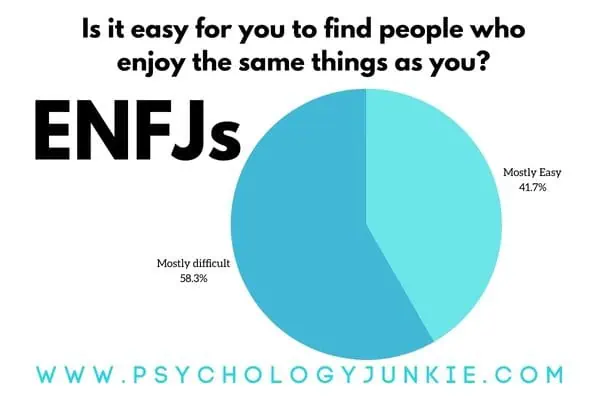
41.67% found it easy
ENFJs, who I call the Mentors, are incredibly empathic, intuitive, and insightful individuals. Their friendly and approachable demeanor draws people in, but their true passions often revolve around intangible, conceptual, and abstract topics, like the meaning of life, love, and real intimacy. But the social world is often lacking in the depth that ENFJs crave. As one ENFJ puts it, “I want to go deep, talk philosophy, dream interpretation, the meaning of love, but I keep it light so I don’t turn anyone off.” Despite this challenge, their ability to read the room and adjust their approach helps them to foster meaningful conversations, albeit sometimes on a more surface level.
8. ISFJ – The Protector

40% found it easy
ISFJs want real, harmonious relationships built on a foundation of shared values. They want to feel like they can be real with their friends; no pretense, no phoniness, just real, down-to-earth discussion, as well as shared agreement on right vs. wrong. Although ISFJs tend to be quiet at first, once they know they can trust someone and be themselves, they will be loyal to the end. Yet several ISFJs mentioned that their introverted nature can make it harder to find people with whom they feel comfortable enough to truly be themselves. One ISFJ stated, “I used to have a lot of friends where I grew up, but most of them moved away and I don’t usually feel like going out when I have made plans to meet up with someone. I feel anxiety and I just like being home where everything’s familiar.”
Find out more about ISFJs: What It Means to be an ISFJ Personality Type
9. ENTP – The Trailblazer

37.36% found it easy
ENTPs, or “The Trailblazers,” are filled to the brim with curiosity, wit, and relentless intellect that can both repel and attract people. On one hand, their thought-provoking ideas and love for debate can excite people who can keep pace with their rapid thoughts. But this same quality can also be overwhelming or even intimidating to those who prefer more day-to-day or easy conversation. ENTPs love to question the norm and play devil’s advocate, which can sometimes make them seem argumentative and cause tension with people who hate any sense of disagreement.
Discover more about ENTPs: 24 Signs That You’re an ENTP, the Trailblazer Personality Type
10. ISTP – The Vigilante

35% found it easy
Analytical and cool-headed, ISTPs focus on understanding how the world works, solving problems, and pursuing a life of freedom and autonomy. Yet for all their independence, ISTPs still crave at least one or two close friendships. They seek out intellectual, laid-back friendships with people who enjoy swapping knowledge, good-natured arguing, or simply sharing in their dry wit and quick comebacks. However, ISTPs often find it difficult to establish relationships, which might be due to their introverted nature or the fact that they don’t like to show vulnerability or make a lot of small talk to create a connection.
Find out more about ISTPs: 24 Signs That You’re an ISTP, the Vigilante Personality Type
The Hardest to Connect
11. INTP – The Prodigy
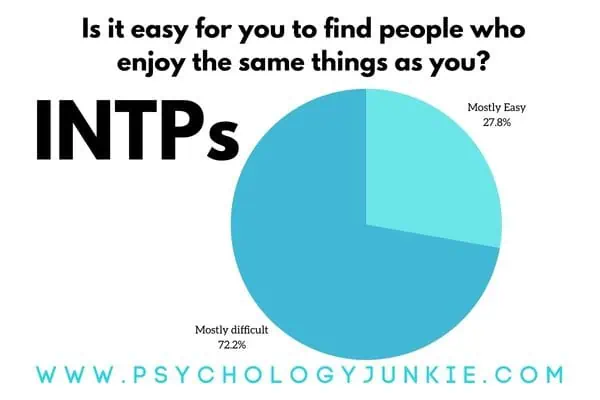
27.78% found it easy
INTPs enjoy sharing ideas, theories, and knowledge. They look for friends who can keep up with their intellectual curiosity and enjoy discussing complex, abstract ideas. They tend to connect with others through online forums or discussion groups where they can find a like-minded community interested in similar topics. However, INTPs might struggle to make friends in person because of their introverted nature and tendency to overthink their interactions with others. “I make most of my friends on forums or gaming platforms,” one INTP said, “I hate small talk and it’s too easy to feel awkward in big social gatherings and later I think about the things I probably said or did wrong.”INTPs enjoy sharing ideas, theories, and knowledge. They look for friends who can keep up with their intellectual curiosity and enjoy discussing complex, abstract ideas. They tend to connect with others through online forums or discussion groups where they can find a like-minded community interested in similar topics. However, INTPs might struggle to make friends in person because of their introverted nature and tendency to overthink their interactions with others. I make most of my friends on forums or gaming platforms,” one INTP said, “I hate small talk and it’s too easy to feel awkward in big social gatherings and later I think about the things I probably said or did wrong.
Discover more about INTPs: 3 Weird and Wonderful Secrets About the INTP
12. INFP – The Dreamer

26.36% found it easy
INFPs have a rich inner world filled with imagination, deep values, and a yearning for authenticity. Their idealistic nature often drives them to seek meaningful, profound relationships where they can express their true selves without fear of judgment. However, this longing for depth can sometimes make it challenging for INFPs to find friends who resonate on the same emotional and intellectual wavelength. Their introspective and reserved demeanor might also contribute to difficulties in forming initial connections. An INFP explained, “I struggle to find friends who genuinely understand me—small talk feels so superficial, and it’s rare to meet someone who appreciates the depth and thoughtfulness I bring to a conversation.”
Read more about INFPs: Your INFP Personality and Your Enneagram Type
13. INFJ – The Mystic
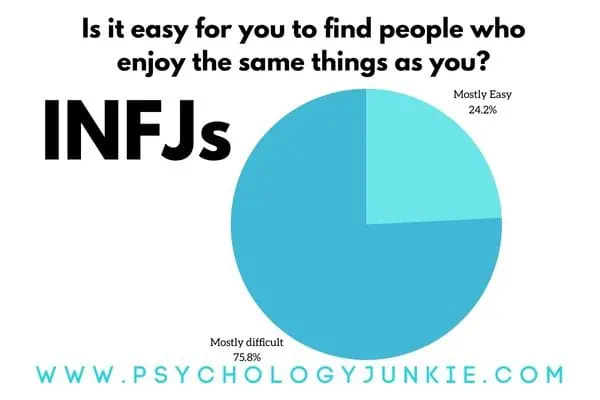
24.21% found it easy
INFJs crave profound, meaningful friendships and are often drawn to people who are both intellectually and spiritually curious. But they often struggle to find people who have the same depth or curiosity that drives them. INFJs often feel like outsiders or misfits. They are more interested in what can’t be seen than what can; the abstract, mysterious, or intangible. One INFJ shared, “I crave friendships where we can discuss our dreams, fears, and the deeper meaning of life. Small talk leaves me feeling empty, but I find it hard to meet people who are comfortable with this level of vulnerability.” Despite these hurdles, the friendships they do form are often marked by a profound bond and a sense of mutual understanding that goes beyond the superficial.
Curious about INFJs? Read 24 Signs You’re an INFJ, the Mystic Personality Type
14. ISFP – The Virtuoso

21.74% found it easy
ISFPs are known for their depth, spontaneity, and deep appreciation for sensory experiences. They look for friendships where they can let their guard down, be real, and discuss their interests, values, or creative avenues. ISFPs need authenticity and have no interest in faking anything; the moment they get any whiff of phony or manipulative behavior they’re out. And quite a few ISFPs mentioned that they struggle to really connect with people, make the first move, and start conversations. I HATE introducing myself,” one ISFP stated. Another ISFP mentioned, “People just don’t want to go out. I’m an introvert, but even I want to go do things, not just sit at home and scroll Tik Tok. I just don’t know anyone who wants to do anything interesting.”
It’s possible that ISFPs find it particularly challenging to find like-minded people because they tend to be more reserved, quiet, and slow to open up. And as the world becomes increasingly focused on digital forms of connection, they may struggle to get close enough to other people to form the kinds of trusting relationships they need in order to let their guard down. If you’re an ISFP and you have any thoughts on this, let us know!
Find out more about ISFPs: How ISFPs Say “I Love You”
15. ISTJ – The Detective

17.14% found it easy
ISTJs are known for their reliability, practicality, and a strong sense of duty. They look for friendships based on mutual respect and shared values. They want friends who enjoy swapping knowledge, sharing opinions, and laughing over some offbeat humor. Yet their reserved and private nature can sometimes make it challenging for them to open up and meet new people. One ISTJ said, “I want friends who are good and honest, but I feel really awkward starting conversations with new people. I don’t go out much, and I enjoy my alone time. But sometimes I worry that I’m not pushing myself hard enough to meet new people.” Despite these hurdles, ISTJs form deeply loyal and enduring relationships, often valuing friendship as a lifelong commitment.
Discover more about ISTJs: 10 Things That Excite the ISTJ
16. INTJ – The Strategist

13.95% found it easy
INTJs are the type who experienced the most difficulty in finding people who share their interests. Part of this likely has to do with their intuitive nature; there are far fewer intuitives than sensors in the world, and INTJs in particular tend to be bored with any topics that don’t have any room for intuitive understanding. They’re interested in strategy, concepts, meanings, and exploring ideas for the future. Small talk and the “getting to know you” phase of friendship can be mind-numbingly dull for them. On top of that, they aren’t the most emotionally demonstrative people in the world. They tend to appear stoic and reserved, and thus, many people don’t find them especially approachable. Believe me, as an INTJ myself, I’ve been accused far too often of having “RBF” or I would call it “RINTJF,” even when I’m in a very happy, friendly mood. Creating a “vibe”, laughing and making friendly chit-chat are not natural skills of the INTJ, although they can learn this if they want to. “I look for friends who are driven and intellectually stimulating, but I grow impatient with all the surface-level conversation, small talk, and mixed messages, especially as an INTJ woman” one INTJ commented.
Find out more about INTJs: Two Inspiring Morning Routines for INTJs
What Do You Think?
Do you struggle to find people with shared interests or is it easier for you? If you were talking to someone with the same personality type as you, what advice or guidance would you give them? Share your thoughts with us and other readers in the comments!
Want to add to this survey? You can express your views here.
I’m also currently conducting a survey about personality types and friendship. If you’d like to be part of it (anonymously) you can do so here.
Discover even more about your personality type in our eBooks, Discovering You: Unlocking the Power of Personality Type, The INFJ – Understanding the Mystic, The INTJ – Understanding the Strategist, and The INFP – Understanding the Dreamer. You can also connect with me via Facebook, Instagram, or Twitter!


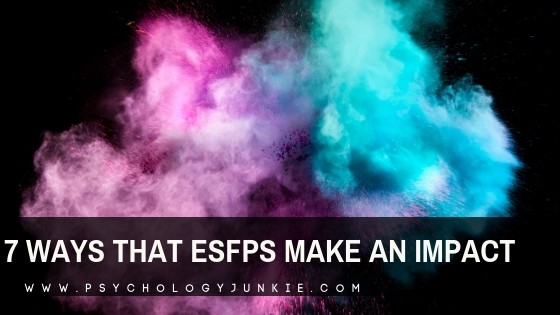










I find it hard to make friends #1 because I’m quiet and am not the type to initiate conversation. I wait for other people to come to me. Then even when people do talk to me and get to know me, if I’m honest with them, they will disagree with me and dislike me. So usually I keep my honest opinions to myself in order to keep the peace, but that makes the relationship shallow and not genuine.
—INXJ
INFP here. On the surface its easy. I read people well and adapt to their style of interaction mostly well, and sometimes I can be nurturing so most people like me. But I let very few people in. Sometimes people think they are within my inner circle but they are not – but I don’t tell them that.
I thought ISTPs are named as virtuosos.